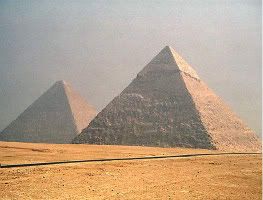Copyright © 2009 Aleya Rouchdy, All Rights Reserved
Recently in Egypt, there has been many discussions regarding the obvious regression in the teaching and in the use of the Arabic language.
In an Arabic TV interview in Egypt, Dr. Ahmad Darwish, member of the Academy of the Arabic Language,* began his discussion on the status of the Arabic language with a question: "why do we demean our mother tongue?"
Of course, due to the phenomena of language contact, Arabic-English, borrowings cannot be avoided, especially the borrowing of technical and scientific terminologies in both colloquial and fusHa. This is acceptable since it is time consuming to begin translating every technical word before pursuing any research or scientific discussion.
The major problem according to Dr. Darwish, lies in the educational system in Egypt that allows the regression of Arabic in schools. According to him "we are the cause students hate the language."
Many private schools do not teach Arabic in Egypt. The language in each of the private school (German, French, English) becomes the primary language of education. Even if Arabic is taught in some private schools, incompetent language teachers whose methods discourage students usually teach it.
Dr. Darwish concludes by saying that every civilized nation strives to protect its mother tongue, while in Egypt we are assaulting our language. Our mission in the Academy, he further states, is to make sure that the language 'is to be used as a gateway to national renaissance rather than being driven to the tomb.'
I could not resist adding this post after hearing the interview with Dr. Darwish on the Egyptian channel Al Masriyya.
Any comment will be welcomed.
*NB: The Academy of the Arabic Language in Egypt was founded in 1934 in order to develop and regulate the Arabic language.
Oct 12, 2009
Subscribe to:
Post Comments (Atom)





In my encounters with Arab Americans and my travels through the Middle East, I have not often come into contact with Arabs who understand, can clearly explain, or offer constructive help with fusHa. Most find it confusing and usually answer my questions with a shrug, "I don't know." When answers are offered, I have learned never to take them at face value because most often they are guesses.
ReplyDeleteFrom the answers to my questions about why they are not familiar with fusHa, it seems to me that most people have a negative emotional connection to fusHa, equating it with a strict and bored atmosphere experienced at school. There didn't seem to be any power, prestige, or further distinction offered for those who speak "correctly."
I remember growing up in my English speaking home and how important it was to speak with correct grammar and how, outside academia, I have met only two Arabic speaking grammar sticklers! And, in fairness, one poet who ONLY speaks and writes in fusHa (who was regarded by others as an oddity and offered a sort of weird kind of reverence for his ability).
I have also encountered plenty of people who will not debate certain things about Islam, for the reason being that they cannot "understand" the meaning intended in the Qur'an. Then I am given the excuses as to why understanding is so difficult, which usually is something to do with language. For example, that Arabic words may have many different meanings in different contexts, etc, etc. I was always baffled as to why then would they not want to become more familiar with the history and development of the Arabic language?
ReplyDeleteAnd my last comment, where are all the Arabs who read books? Why is there so little translation of Western literature and other information sources into Arabic? Where is the market? Why aren't people demanding access to written information?
ReplyDelete